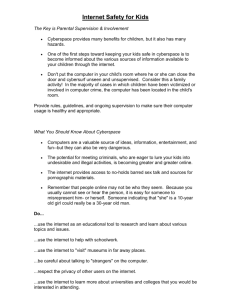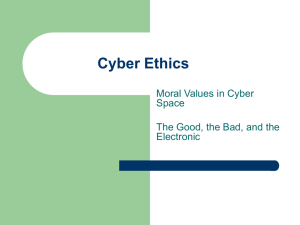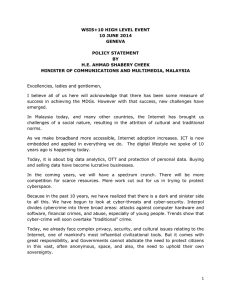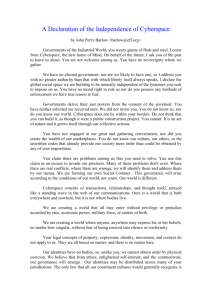Document 13580625
advertisement
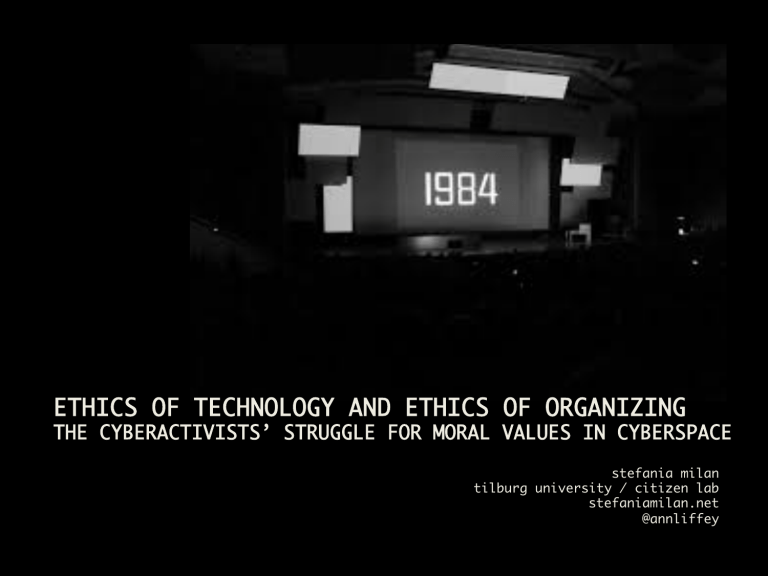
ETHICS OF TECHNOLOGY AND ETHICS OF ORGANIZING THE CYBERACTIVISTS’ STRUGGLE FOR MORAL VALUES IN CYBERSPACE stefania milan tilburg university / citizen lab stefaniamilan.net @annliffey collective action in cyberspace that addresses network infrastructure or exploits the infrastructure’s technical and ontological features for social change something new in the realm of “organized civil society” • from professionalized and membership-based networks into temporary actionoriented coalitions • disembodiment of resistance and physical presence • “connective action” • role of individuals tech activism is concerned with creating and shaping digital technology infrastructure to facilitate communication and networking for social change activists a form of social organizing • tech-savvy activists put their skills at the service of social movements, and, e.g., set up activist servers • a movement within the movement that brings the critique of mainstream communication platforms to the next level, that of the creation of alternatives cyberspace as object of contention: infrastructure is not neutral activists embody moral norms and alternative narratives of cyberspace: ethics of organizing ßà ethics of technology “the so-called grass-roots 'social movements' needed new networks of communication that could not only work as a platform to project discourses and practices to the 'wider world', but also that the way these networks were created, run and developed, mirrored, as much as possible, the direct, participatory, collective and autonomous nature of the emerging social movement(s) themselves” • rejection of top-down power: autonomy of the individual (no representation and delegation) and autonomy of the group (as selfgoverning unit) • rejection of hierarchical structures: decentralisation, horizontality, participation, consensus • ‘the way is the goal’ • recruitment based on trust and loyalty; learning (‘affinity group’) • knowledge sharing, division of labor rooted on individual skills (‘community of practice’) • horizontality but ‘dictatorship of action’ • the group is invisible – action is visible: groups as functional units oriented to action • policy-sceptical: no interaction with policy processes, no dialogue with institutions • 'by-pass' regulation and expand unregulated spaces • focus on prefigurative action: creation of alternatives here and now internal code tech code • regulating interpersonal relationships and group dynamics • equality (no hierarchies, direct democracy, consensus; ‘dictatorship of action’) • participation (first-person engagement and individual responsibility; communitarianism, shared ownership, collective improvement) • autonomy (hands-on; DIY; users, self-organization, selfdetermination) • regulating how technology and networks should look like • equality (e-commons; bits/code) • autonomy/self-determination (built-in privacy; no state interference; nuisance campaigns) • openness (accessibility, malleability, transparency of standards and architecture; knowledge sharing, collective improvement) • freedoms (of access, dissent, expression, sharing, ‘hack’) design of technology (both process and outcome) “DIY media projects are in the lucky position to define their activities themselves, therefore they can be very utopian, very experimental. They don't have the pressure to present an outcome at the end, and they can afford to be radical in their practice and analysis, without the need to find consensus with more established organizations. As such, they might have the function of some utopian 'guiding star', the star that provides a fix point of navigation for sailors, who use it for orientation without attempting to reach it” alert! shameless self-promotion Social Movements and Their Technologies: Wiring Social Change Nov 2013 | 240 pp. | 9780230309180

